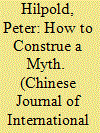| Srl | Item |
| 1 |
ID:
170421


|
|
|
|
|
| Summary/Abstract |
In the 19th century neutrality was a highly appreciated concept. In the 20th century it widely lost relevance and in principle it should be incompatible with UN membership. However, also under the UN system, some States have opted for neutrality and it can be argued that there is still space for this status within the universal peace order. In fact, this peace order is far from perfect. There are several lacunae in the prohibition of the use of force and this concept is open to different interpretations. New threats, such as international terrorism, are emerging that could threaten the absolute prohibition of the use of force. It is contended here that neutrals could play an important role when it comes to finding an interpretation of this prohibition that best could reconcile the goals of peace and security with the overall—still imperfect—structure of the UN system. These questions are analysed with primary reference to Austrian neutrality which on the one hand seems obsolete but on the other is forcefully looking for a new meaning.
|
|
|
|
|
|
|
|
|
|
|
|
|
|
|
|
| 2 |
ID:
139151


|
|
|
|
|
| Summary/Abstract |
The Ukrainian crisis poses a new challenge of an extraordinary dimension to traditional international law. Many well-established concepts of international law have been put to the test. For some, in the wake of the Kosovo advisory opinion a new international law is in the making and the Ukrainian crisis is only a further episode in a longer lasting process pointing in the same direction. For others, the Ukraine case is absolutely particular and in this context historical considerations should prevail over legal dogmatism. It is argued here that traditional international law is very well suited to deal with the Ukraine case. It is further submitted that international law as it stands is flexible enough to cater to the needs of all parties involved. While the concept of territorial sovereignty is not negotiable, there are plenty of instruments and procedures available that should not only guarantee full protection of the Russian speaking groups within the Ukrainian State but also the actual promotion of their rights.
|
|
|
|
|
|
|
|
|
|
|
|
|
|
|
|
| 3 |
ID:
107079


|
|
|
|
|
| Publication |
2011.
|
| Summary/Abstract |
In comparison to GATT law, WTO law is characterized by a notably expanded coverage. Since its inception in 1995, its material density and reach has been further extended. It was only a question of time before the demand would arise for this branch of law to fulfil objectives lying outside the traditional borders of International Economic Law (IEL). In particular, it was recognized that WTO law touches in many ways upon human rights issues. Vigorous claims were made to transform the WTO order into a human rights organization. Some authors were of the opinion that human rights law (HRL) could be integrated into WTO law via the interpretative rules of the VCLT. This contribution tries to evidence that such attempts are inherently flawed. There is no possibility, nor even a perceptible need, to transform the WTO system into a human rights instrument. After examining the many areas of interaction between HRL and IEL, it is evidenced that the many common ends of each branch of IL are best served if both masses of law are mutually coordinated but at the same time maintain their autopoietic nature. This is also to demonstrate that the consideration of this fragmentation as a so-called problem of IL is overrated.
|
|
|
|
|
|
|
|
|
|
|
|
|
|
|
|